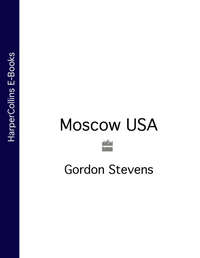
Полная версия
Peace on Earth

GORDON STEVENS
Peace on Earth

COPYRIGHT
This novel is entirely a work of fiction. The names, characters and incidents portrayed in it are the work of the author’s imagination. Any resemblance to actual persons, living or dead, events or localities is entirely coincidental.
HarperCollinsPublishers Ltd.
1 London Bridge Street
London SE1 9GF
First published in Great Britain by Hodder & Stoughton Ltd 1987
Copyright © Gordon Stevens 1987, 1997
Gordon Stevens asserts the moral right to be identified as the author of this work
‘Do not go gentle into that good night’ reproduced by kind permission of J.M. Dent & Sons Ltd from The Poems by Dylan Thomas.
‘I Believe in Father Christmas’ lyrics by Greg Lake, Peter Sinfield. Copyright © 1977 by Leadchoice Ltd, administered worldwide by Campbell Connelly & Co. Ltd, 8/9 Frith St, London WIV 5TZ.
Used by permission. All Rights Reserved.
All rights reserved under International and Pan-American Copyright Conventions. By payment of the required fees, you have been granted the non-exclusive, non-transferable right to access and read the text of this ebook on screen. No part of this text may be reproduced, transmitted, down-loaded, decompiled, reverse engineered, or stored in or introduced into any information storage and retrieval system, in any form or by any means, whether electronic or mechanical, now known or hereinafter invented, without the express written permission of HarperCollins ebooks
HarperCollinsPublishers has made every reasonable effort to ensure that any picture content and written content in this ebook has been included or removed in accordance with the contractual and technological constraints in operation at the time of publication
Source ISBN: 9780006473152
Ebook Edition © SEPTEMBER 2016 ISBN: 9780008219369
Version: 2016-11-03
DEDICATION
For Emily and Joe, who do not know.
And Souraya and Dyala, and the family
in the photograph, who do.
AUTHOR’S NOTE
Peace on Earth describes situations and events in the mid-1980s. Since then, some things have changed. The Soviet Union, for example, no longer exists.
Sadly, other things remain the same.
CONTENTS
Cover
Title Page
Copyright
Dedication
Author’s Note
Prologue
Book One
Book Two
Chapter One
Chapter Two
Chapter Three
Book Three
Chapter One
Chapter Two
Chapter Three
Chapter Four
Chapter Five
Book Four
Chapter One
Book Five
Chapter One
Chapter Two
Chapter Three
Book Six
Chapter One
Epilogue
Keep Reading
About the Author
Other Books By
About the Publisher
PROLOGUE
The boys were nine, almost ten.
They sat on the rock, the man beside them, watching the sun rise over the valley of the Jordan, the sweep of light spreading from the east and the shadows of the night disappearing.
‘When will you tell us the story?’ they asked.
‘What story?’ replied the man.
He remembered the morning he had sat on the rock and waited, the morning he had sat on the rock and wished he had never been born, the morning he had sat on the rock and wished they had never set him free.
‘The story that began with a verse from a poem.’
‘The story that began with a dream.’
‘The story that began with the family from the far-off land.’
They knew that he was playing the game with them, that he always played the game with them, and wondered why he would not tell them. The sun was growing warmer.
‘When will you tell us the story?’ they asked again.
‘What story?’
One day, he knew, he would no longer be able to hide the truth from them. One day he would tell them.
‘The story about the little boy.’
‘The story about the little boy who was born in Bethlehem.’
He knew what they were going to say.
‘The story about the little boy who died to save us all.’
He thought about the boy, about what the boy had done when he had grown to manhood, what the boy had done when he had been their age. The shadows had gone from the land. He knew that they were old enough to know, that they were too old not to know.
‘Today,’ he said at last. ‘I will tell you the story.’
Book One
The verse from the poem
And you, my father, there on the sad height,
Curse, bless, me now with your fierce tears, I pray.
Do not go gentle into that good night.
Rage, rage against the dying of the light.
from Dylan Thomas
‘Do not go gentle into that good night’
The dream
The tunnel was long, filled with smoke, the flames coming at him. He was moving down it, eyes sweeping from left to right. Not his eyes, she dreamt, it was as if he was behind his eyes, as if he could see the destruction around him through the sockets of his eyes. His breathing was deep and rasping, as if it was not his breathing. She heard the voice, guiding him, telling him where to go, what to do. Protecting him, committing him. She tried to wake from the dream, to take him from the tunnel, saw the death around him, unsure whether it was his death or the death of another. He was moving on, the smoke and flames coming at him, engulfing him, as if he was descending into Hell. She heard the voice again, saw the death again. His death or someone else’s, she was still not sure. He was moving on, deeper into the tunnel. She could no longer see him.
The family from the far-off land
The weather that morning was cold, even for Moscow.
Yakov Zubko knew what it meant – that the winter would be long and hard. He rose, moving quietly and carefully so that he did not disturb his wife and children, and left the flat. The streets were still empty. By the time he reached the metro station at Sviblovo it was twenty minutes past five. He paid his fare and hurried down the stairs. There was only one other man on the platform. Yakov Zubko tried not to look at him and wondered if the man was waiting for him. Somewhere they were waiting for him; somewhere the men from Petrovka would always be waiting for him. Him and the likes of him.
He remembered the other man, the man in the house on Dmitrov, and stepped onto the train. There were three passengers already in the compartment, Yakov Zubko heard the doors shut behind him and chose a seat close to them. Never sit in a corner, never sit where they would look for you, where the men from Petrovka would think you were hiding. He looked to see what the man on the platform was doing and counted the kopeks in his pocket.
There were twelve stops to Marx Prospekt, he watched at each to see what the man who had been on the platform would do, and counted again the kopeks in his pocket. Each day he counted them, telling himself how the kopeks became roubles, reminding himself how precious was every single rouble. Precious enough now, while he had work, while the tourists were still in Moscow and he could trade with the man in the house on Dmitrov. Even more precious later when the winter froze the streets, when the hotel found out about him and threw him out, when he and Alexandra could barely afford the kasha and the vegetable soup which scarcely kept them and the children warm. Precious, too, as he and Alexandra sat together each evening and estimated how many roubles they would need, how many roubles they had managed to save since they had applied again to the office on Kolpachny Lane.
He remembered how much was in the tin they kept under the bed, remembered how much to the last rouble, and thought again of the man in the house on Dmitrov. He did not give the best prices, Yakov Zubko could have got more in the streets behind Begovaya, but the man on Dmitrov was reliable, and no matter how much he and Alexandra needed the extra roubles it was a risk even he could not afford to take.
The train arrived at Marx Prospekt. He left the station and crossed to the hotel.
Alexandra waited till he had left the flat, then crossed the room and watched him making his way along the street. He was a good man, a good husband and father: the way he played with the children, took them to feed the swans in Gorky Park, the way he left the flat each morning without waking them, not knowing that she was awake, listening to him, telling him to be careful. Even the way he did not tell her about the man in the house on Dmitrov, or the faceless men from the building on Petrovka.
She stood at the window till she could no longer see him, then turned back into the room, feeling the cold and knowing it would soon bring the winter, wondering what else it would visit upon them. He was a good man, she thought again, remembering what he did for them, how he sought to protect them from what he did, from the inevitable day when he would be betrayed and caught, how he tried to hide from her the secret of the house on Dmitrov. She knew the secret anyway, had heard him talk about it in his sleep, even knew the name of the man, had heard her husband work out in his sleep how much Pasha Simenov would pay him.
She felt the cold again. Not today, Yakov Zubko, she asked him, please not today.
The unmarked Zhiguli left the building overlooking Petrovka at six and was in position by six fifteen. Iamskoy let the engine run, keeping the car warm, and instructed the militiaman at his side to make the first entry in the day’s log. The operation was routine but important, the sort of assignment that had been gathering momentum since those with political connections at Petrovka had begun to prepare for the tide of change that would sweep from the Kremlin now the new guard had taken control there. Big enough to make the statistics look good, especially if they netted someone deemed undesirable by the state, even more so if they managed to ensnare a foreigner upon whom they, or someone else, could exert the usual pressure, but small enough not to interfere with the private lives and arrangements of the big boys, the bolshaya shiska, for whom the statistics were intended.
The street in front of him was beginning to get busier, not busy, just busier, there was still no movement from the house under observation. He looked at his watch. There were two shifts on the operation, six to two and two to ten; he had organised it that way, using his authority to get the early shift, not so that he would be off-duty by mid-afternoon, but because that way he could exercise more control over who made the arrest. Not today, he had thought as they left militia headquarters that morning, not enough contacts noted in the log book for the arrest to be made today, probably tomorrow, certainly the day after. Routine but important, he had seen it from the moment the surveillance had been first planned. Which was why his superiors had chosen it, why it would look good in their statistics. Why he, in turn, would make sure it was a success, why he had arranged it so that it would be he who made the arrest.
In an upstairs room he saw a curtain move and wondered who would be coming to buy, who, more importantly for the statistics, would be coming to sell. He checked again the name of the black marketeer in the house on Dmitrov.
Pasha Simenov.
The letter arrived at eleven.
Each morning Alexandra waited for it to come. Each morning after she had taken their son to school and settled their daughter in the flat, she waited for the sound of the postman on the landing outside. Each morning she heard him as he put his bag down, knowing that he was only regaining his breath, that he would pick up the bag and walk on.
She heard the noise on the stairs, the silence as the man paused outside and searched in his bag for the letter that was bound to come, then heard the next noise, the sound of the man lifting his load and continuing his climb to the floors above. The child was looking at her; she sat back at the table, trying to concentrate, disappointed that the letter summoning them to Kolpachny Lane had not come but relieved that they had not yet been rejected again.
The footsteps came down the stairs and past the flat, quicker, lighter, fading till she could no longer hear them. Alexandra smiled at her daughter and thought of her husband and son, heard the footsteps again, slower, more laboured, the sound of the postman climbing back up the stairs. The man stopping on the landing outside, the first corner of the envelope beneath the door. Thin, she thought, crossing the room, suddenly not knowing what she was doing, it was so thin, just as before. She knew what it meant, opening it, ignoring the time and date of the summons, realising that they had lost again, that they had lost for ever.
The words were a blur. She put the letter on the table and looked at her daughter, wishing suddenly that she and Yakov had not tried again, had never tried. Not for their sakes, but for their children’s. The girl was still playing. Alexandra picked up the summons again and saw the date and time of the appointment, realising it was for today and knowing that they had delayed the letter so that she and Yakov would miss the appointment, so that she and her husband would give them even more reason to refuse, them again. No time to contact him, she was thinking, no way she could contact him at the hotel in any case. There was just enough time, she was thinking, looking at the clock. If she hurried, if the trams weren’t delayed.
Five minutes later Alexandra left the flat, her daughter wrapped against the cold, and began the journey. The trams seemed even slower than usual.
Alexandra reached the building in Kolpachny Lane five minutes before the appointed time and was told to wait till after lunch. She sat in the waiting room and tried to stop her daughter crying; after seventy minutes she was ushered in and instructed to sit in the chair she had sat in last time and the time before, facing the official who had spoken to her the last time and the time before.
There were two stacks of files on the desk in front of him. He confirmed her name and selected a folder from those on his left, reading through it then checking the details against the information on the summons she had received that morning.
‘Why is your husband not with you?’ she knew he was going to ask, knew that it would be a trick, that they had already found out where her husband was, that the faceless men from Petrovka had been waiting for him as he had feared in his dreams.
‘I don’t know,’ she would lie, holding her child tight to her, ‘the summons arrived only this morning, he left before it came.’
‘And you don’t know where your husband went?’ There would be the first note of an interrogation in his voice.
Be brave, Alexandra Zubko, she would tell herself, do not let them frighten you. Remember that they have refused you twice, that they have already decided to refuse you a third time.
‘It doesn’t matter where my husband is,’ she would wish already that she had not answered the official in such a manner, would know it was too late, ‘the invitation is to me, I am the one you must tell, not my husband.’
The man began reading from the file, not bothering to look at her, reading the words he would forget the moment she left, the words she would remember for ever.
Fifteen minutes later Alexandra left the office on Kolpachny Lane and turned for home.
Not today, Yakov Zubko, she knew now why she had pleaded with her husband that morning, why she had been afraid of the sudden cold, of the winter it would bring, of what else it might visit upon them. For God’s sake not today.
It was twenty three minutes past one.
The American family lunched at twelve. Yakov Zubko watched them from the side of the foyer: the mother and father, the two children. They had been at the hotel eight days and he had seen them on the third. Each day after that he had made a point of meeting them, of helping them with their bags, each day after that he had smiled at them. On the fifth day one of them had smiled back. Then and only then had he risked checking their names on the hotel register, noting both their nationality, which he had already guessed, and their date of departure.
By the time they finished it was twenty-five minutes to two. Yakov Zubko saw them waiting for the official bus and remembered where all the tourists went on their last day in Moscow, began to plan his afternoon so that he could make his approach to them when they returned.
At fifteen minutes to two the unmarked Zhiguli left its position overlooking Dmitrov and returned to the militia headquarters on Petrovka. By two fifteen the next shift had taken over. Although there had been two visits to the black marketeer that morning, Iamskoy had instructed the militiaman to log only one: a further visit that afternoon was almost certain, two probable, three remote but possible, and a total of five visits on the second day of the surveillance was the point at which the team on duty could close their snare. Routine but important Iamskoy had decided. The following morning, he had therefore decided, he would arrest the suspect Simenov and those who brought their goods to him.
The flat was quiet. Alexandra looked around it, knowing what she was about to do, sensing that Yakov Zubko would understand. The furniture was sparse and functional; three of the chairs round the table had been bought over the years, but the fourth was a family heirloom, a wedding present from a beloved grandfather, now dead. Carefully, taking care not to damage it, she carried the antique down the stairs, perched it on top of her daughter’s push-chair, and tied it in place with a piece of string. Then she gathered the girl in her arms, and went to collect her son from school.
He was ten minutes late. When he came out she kissed him then set off, still carrying her daughter, along the route her husband had taken that morning. The walk took twenty minutes, Alexandra managed the child for the first ten before she became too heavy.
The men outside the shop saw her coming, nudging each other to look at her, scarcely bothering to hide their amusement. They were all young, dressed in fur coats and lounging against the estate cars parked outside the shop. One of them was helping another man, someone she took from his clothing to be a foreigner, to load a desk onto one of the cars. She had heard about the shop, that it was where the foreigners came to buy the equipment for their offices and the furniture for their homes, one of the places to which the authorities turned one of their many blind eyes. The foreigner turned to watch her, slightly fascinated, slightly embarrassed by the image of the woman pushing the pram with the chair on top, the two children walking bravely on either side of her. He had been a correspondent in Moscow for six months, and had learnt sufficient Russian in the time to understand what the young men in the fur coats were saying, enough to understand the sexual innuendo of their remarks. The driver he had hired to take the desk to his office was becoming impatient. He told the man to wait, watching the woman as she struggled to push the pram and its load through the door, no one moving to help her, and followed her inside, calculating how much the man in the shop would charge him for such a chair, was not surprised when the man gave the woman less than a thirtieth of what he estimated it was worth. Outside it was getting dark. He watched the way the woman folded the notes into her purse and tucked the purse carefully into the pocket of her coat, the way she lifted the girl at her side into the pram and pulled the boy close to her, the way she disappeared down the road, wanted to know what she was doing, why she was doing it, wanted to wish her luck, tell her that one day all would be well for her. Behind him he heard his driver start the engine of the estate car; he turned away from the woman and went back to his office.
The American family returned to the hotel at five, their arms laden with parcels wrapped in the colours of the Beryozka shops. Yakov Zubko watched them from the side of the foyer. The official guide was laughing and joking with them, for one moment he feared that she had already arranged the same thing he had been planning since he had first seen them, then she turned away to talk to another group. He crossed the foyer, arriving at the lift as they did, holding the doors open for them and helping the children with their parcels, then followed them in, pressing the button to close the doors before anyone could join them.
‘Good afternoon,’ his English was formal, almost mechanical, from the books he had studied since he had lost his job as an engineer. ‘I hope you enjoyed your stay in Moscow.’
The husband looked at him suspiciously. ‘Yes, thank you,’ he replied carefully.
The doors were shutting.
‘Everyone goes to the Beryozka shops on their last afternoon,’ Yakov Zubko explained, trying to relax them. He had only one chance, he thought. The doors were almost shut. ‘How old are the children?’
An elderly couple pushed forward and tried to step into the lift. The husband saw them and jerked the doors open for them. Yakov Zubko understood why he had done it, that the man knew why he had joined them, what he was going to ask them. One chance, he told himself, already slipping away.
The elderly man thanked the American and asked for the fourth floor. The Americans were in rooms 607 and 609, two floors above the others, Yakov Zubko remembered. The chance not quite gone. The lift stopped at the fourth floor and the other couple stepped out, the doors closing and the lift gathering speed again.
‘How old are the children?’ he asked again, looking at the denims they were wearing, not disguising the fact, letting the parents know there was a reason.
‘Twelve and ten,’ said the mother, not looking at him.
He nodded, looking back at the denims, hoping he was right but fearing he was wrong. ‘Mine are the same age.’ They all knew he was lying. ‘May I buy the children’s denims from you before you leave?’
The lift passed the fifth floor.
‘No.’ It was the third time the husband had rejected such a request that day. Be careful, his company had advised him when he informed them where he was taking a holiday, the Russians were always looking for people like him, especially in a profession like his, always seeking ways of entrapping them. ‘No,’ he said again emphatically, turning away.
Yakov Zubko sensed that the man would not change his mind and told himself there would be other families, other people who were not afraid, admitted to himself that it was already the beginning of winter, that there would be few other tourists before the weather set hard and the hotel found out about him.
The wife was still looking at him. ‘I understand,’ he was saying to her, the lift stopping and the husband and children getting out. ‘Thank you anyway.’ His finger was drawing the pattern on the wall, the woman still looking at him, at the pattern. He knew it would not work, that he should not do it, should not risk so much, the words coming anyway, telling her who he was, what he was. Telling her everything.






